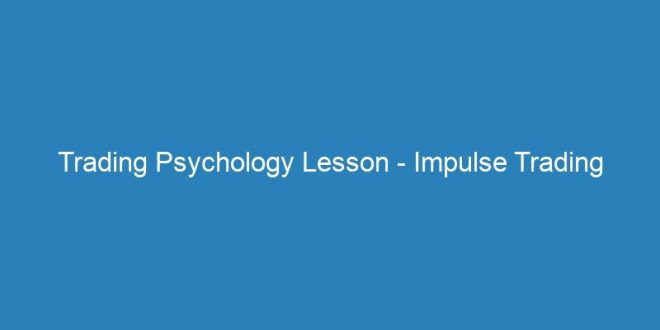In this article, we’re going to look at the concepts of good and bad trade. We will find that good trades are the result of “good trading decisions” but unfortunately can still have “bad results”.
On the other hand, bad trades are the result of “bad decisions” and can sometimes even lead to “good results”.
The trader’s best weapon to break the mold of most beginners who lose a lot of money in the market is to focus solely on good trades and not worry too much about good or bad results.
In our workshops, we aim to provide students with strategies that will help identify the best trades that match specific and personal trades. We have a number of trading strategies that allow you to take advantage of the stock market, each strategy using a particular structure or “setup” to formulate smart trades. However, most traders do not have such a structure and therefore too often succumb to the dreaded “impulse trading”.
It is a largely ignored concept in the investment literature and refers to unstructured, non-methodical, or untreated trading.
Surrender to spontaneity
We’ve all been through this!
You look at the chart, suddenly see price moving in one direction or another, or the chart is forming a short term pattern and we step in before we see the risk / return, another open position, or a number of others Take into account the key. Factors to think about before entering a trade.
Sometimes it feels like we’re putting a trade on autopilot. You may even find yourself staring at a newly opened position and thinking, “Did I just place it?”
All of these terms can be summarized in one form – impulse trading.
Impulse trading is bad because it is done without proper analysis or method. Successful investors have certain trading methods or styles that do them good, and impulsive trading goes beyond these ordinary methods. It is a bad trading decision that leads to a bad trade.
But why would a trader suddenly and spontaneously break his tried and tested trading formula with impulsive trading? That doesn’t happen often, does it? Unfortunately, this happens all the time – even though these transactions violate learned trading reasons and behavior.
Even the most seasoned traders have succumbed to impulsive trading, so if you do it yourself, you won’t feel too bad!
How it happened
If it doesn’t make sense then why do traders give in to impulsive trading? As with most bad investment decisions, there is a complex psychology behind it.
In short, traders often succumb to impulsive trading when they have withheld a bad trade for too long, hoping, for whatever reason, that things will “turn out well”. This situation is exacerbated when a trader knowingly – voluntarily – places an impulsive trade and then has to deal with the added burden of losing.
Unsurprisingly, one of the first psychological factors involved in impulsive trading is risk.
Contrary to popular belief, taking risk isn’t always a bad thing. Risk is simply an inevitable part of playing the markets: there is always risk in trading – even with the best structured deals. In smart trading, however, the structure is in place prior to the transaction to account for the risk. That is, the risk is taken into account in the agreement, so the risk of loss is accepted as a percentage of the expected return. If losses occur in this situation, it is not due to bad / impulsive trading or trading psychology problems – it is simply due to unfavorable market conditions for the trading system.
Impulse trading, on the other hand, occurs when risk is not taken into account when making decisions.
Risk and fear
The psychology behind impulsive trades is simple: Investors take risks because fear drives them. There is always a fear of losing money playing in the market. The difference between good and bad traders is that the former are able to manage their fears and reduce their risk.
Impulsive trading occurs when traders ignore risk in fear of losing what appears to be a “winning” trade. These impulsive emotions often lead investors to break their usual formula and toss their money in the market in the hopes of “not losing the campaign’s potential”.
Wish
NS’. However, impulse trading is never smart – it’s bad.
When traders spot a potential opportunity and spontaneously decide they should make a trade – and then calm down and use a good strategy to execute the deal – this is no longer an impulsive trade. However, when traders ignore setup triggers or some form of trading method, they have been cautious and have implemented a bad trade.
Yang sedang di cari:Mastering Trading Psychology: Strategies for SuccessTraderLion Trading Psychology Masterclass
 KRETENG.COM Website Review Bisnis, Tempat dan Harga Produk Terbaik di Indonesia
KRETENG.COM Website Review Bisnis, Tempat dan Harga Produk Terbaik di Indonesia

